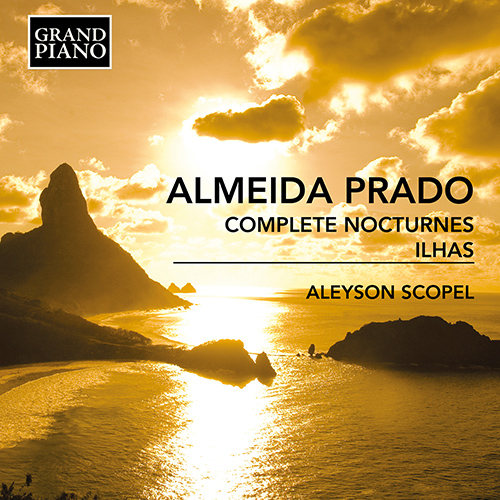
About this Release
“This recording, a follow-up to Almeida Prado's complete Cartas Celestes for piano, demonstrates how multifaceted and varied his sound world is. The Nocturnes are pearls of intimacy and lyricism and pay homage to the idiom of other composers with whom Almeida Prado had an affinity. Nocturne No. 4 is an audience favourite and one of the simplest, yet most memorable. My personal favourite is No. 1, which sums up his inventive new gestures. Ilhas (‘Islands’) is a piece that precedes the compositional techniques employed in his Cartas Celestes, and already shows how the piano's resonance plays a very important role.” — Aleyson Scopel
ALMEIDA PRADO, JOSÉ ANTÔNIO REZENDE DE (1943–2010)
Complete Nocturnes • Ilhas
- Aleyson Scopel, piano
Almeida Prado’s colossal piano cycle Cartas Celestes (‘Celestial Charts’) offers a paradigm of audacious invention (GP709, 710, 746, 747) but between 1985 and 1991 this prolific Brazilian composer also wrote a set of 14 nocturnes that display the genre’s lyrical impulses. Along with abstract elements and features such as synesthesia, used in homage to his teacher Messaien, the full range of influences can be felt in Almeida Prado’s Nocturnes: Chopin, Scriabinesque colour, bossa-nova, Brahms-like intervals, serenity and radiant songfulness. Ilhas (‘Islands’) is a mystical but programmatic work, the predecessor of Cartas Celestes in many essential elements. Aleyson Scopel is an award-winning Brazilian pianist and one of Almeida Prado’s greatest contemporary advocates.
Tracklist
|
1
Nocturne No. 1 (1985) (00:03:16)
|
|
2
Nocturne No. 2 (1985) (00:04:34)
|
|
3
Nocturne No. 3 (1985) (00:04:45)
|
|
4
Nocturne No. 4 (1985) (00:03:22)
|
|
5
Nocturne No. 5 (1985) (00:04:58)
|
|
6
Nocturne No. 6 (1986) (00:03:34)
|
|
7
Nocturne No. 7 (1987) (00:03:48)
|
|
8
Nocturne No. 8 (1987) (00:02:38)
|
|
9
Nocturne No. 9 (1987) (00:03:41)
|
|
10
Nocturne No. 10 (1987) (00:02:10)
|
|
11
Nocturne No. 11 (1991) (00:03:07)
|
|
12
Nocturne No. 12 (1991) (00:03:55)
|
|
13
Nocturne No. 13 (1991) (00:02:45)
|
|
14
Nocturne No. 14 (1991) (00:05:01)
|
|
15
Ilhas (Islands) (1973) (00:17:54)
|
The Artist(s)
 Brazilian pianist Aleyson Scopel has performed worldwide in solo, chamber and concerto settings. A recipient of the Nelson Freire and Magda Tagliaferro awards, he has also won numerous prizes in international competitions such as the William Kapell, Villa-Lobos, Corpus Christi, Kingsville and Southern Highland International Piano Competitions. His performance of the first set of Cartas Celestes by Almeida Prado was thus received by the composer: ’It came straight from heaven! Meteor Showers, radiant constellations, glowing nebulae and a transcendental vitality marked the genial interpretation of this colossal pianist.’ Prado would later dedicate to Scopel the 15th set of the series. Aleyson Scopel graduated with distinction in performance and academic honours from the New England Conservatory of Music, in Boston.
Brazilian pianist Aleyson Scopel has performed worldwide in solo, chamber and concerto settings. A recipient of the Nelson Freire and Magda Tagliaferro awards, he has also won numerous prizes in international competitions such as the William Kapell, Villa-Lobos, Corpus Christi, Kingsville and Southern Highland International Piano Competitions. His performance of the first set of Cartas Celestes by Almeida Prado was thus received by the composer: ’It came straight from heaven! Meteor Showers, radiant constellations, glowing nebulae and a transcendental vitality marked the genial interpretation of this colossal pianist.’ Prado would later dedicate to Scopel the 15th set of the series. Aleyson Scopel graduated with distinction in performance and academic honours from the New England Conservatory of Music, in Boston. The Composer(s)
 One of the most prolific composers to emerge from Brazil, José Antônio Rezende de Almeida Prado began as a cultivator of nationalism, studying with Camargo Guarnieri, but as a pupil of Boulanger and Messiaen in Paris was compelled to look for other means of self-expression, attaining a level of aesthetic freedom which encompassed atonalism, post-serialism, extended and free tonalism. Among his most important achievements, referred to by him as an “incredible adventure”, are his 18 Cartas Celestes (Celestial Charts), a set of works depicting the sky and constellations, in which he adopted a new harmonic language called “transtonality”. Of the 18 Cartas Celestes, 15 are written for solo piano, while the remaining three are scored two pianos and symphonic band (No. 7), for violin and orchestra (No. 8) and for piano, marimba and vibraphone (No. 11).
One of the most prolific composers to emerge from Brazil, José Antônio Rezende de Almeida Prado began as a cultivator of nationalism, studying with Camargo Guarnieri, but as a pupil of Boulanger and Messiaen in Paris was compelled to look for other means of self-expression, attaining a level of aesthetic freedom which encompassed atonalism, post-serialism, extended and free tonalism. Among his most important achievements, referred to by him as an “incredible adventure”, are his 18 Cartas Celestes (Celestial Charts), a set of works depicting the sky and constellations, in which he adopted a new harmonic language called “transtonality”. Of the 18 Cartas Celestes, 15 are written for solo piano, while the remaining three are scored two pianos and symphonic band (No. 7), for violin and orchestra (No. 8) and for piano, marimba and vibraphone (No. 11). Reviews
“This is an interesting, illuminating album… Prado’s music has a sensitive and sympathetic interpreter in Scopel. ” – American Record Guide
“Scopel is a master of both mood and articulation, bringing out the structure of these pieces without over-emphasizing anything yet still making every note, even in the inner voices, audible to the listener. Quite simply, this is an astounding album.” – The Art Music Lounge

“[Scopel’s] play with colors and the resulting atmosphere are captivating. ” – Pizzicato

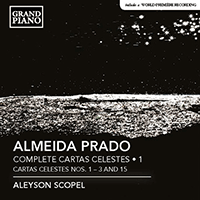
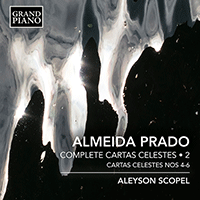
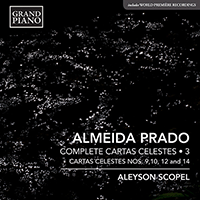
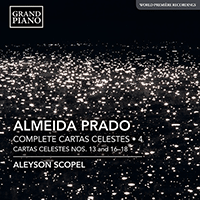
 Grand Piano has gained a reputation for producing high quality recordings of rare keyboard gems. Dedicated to the exploration of undiscovered piano repertoire, the label specialises in complete cycles of piano works by many lesser-known composers, whose output might otherwise have remained unknown and unrecorded.
Grand Piano has gained a reputation for producing high quality recordings of rare keyboard gems. Dedicated to the exploration of undiscovered piano repertoire, the label specialises in complete cycles of piano works by many lesser-known composers, whose output might otherwise have remained unknown and unrecorded.






